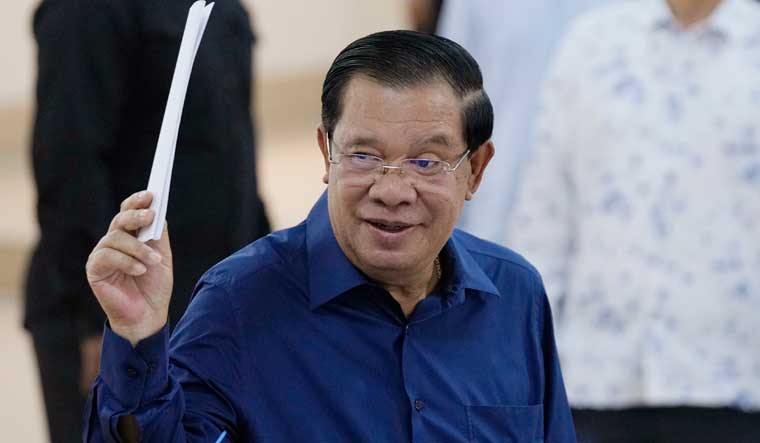On Sunday, the Southeast Asian nation of Cambodia will witness over 9.7 million of its 16-million population heading to poll booths to elect the new government. However, there won't be a nail-biting finish or any major upsets. There wont be any dark horses either. For, the election is a one-horse race with all strong opposition parties silenced, jailed or banned.
Prime Minister Hun Sen's Cambodian People's Party (CPP) is expected to sweep all 125 seats in the country’s national assembly, a repeat of the 2018 elections, which was widely considered a sham. Though there are 17 small parties contesting the elections, none are large or influencial enough to give CPP a fight, having won no elections in the past four years.
Polling stations witnessed long queues since morning, and by noon, over 6.2 million of the 9.7 million eligible voters had cast ballots, said National Election Committee official Dim Sovannarom.
The last nail in coffin of electoral democracy in Cambodia happened last May when the country's only opposition, the Candlelight Party, was disqualified. Though lack of proper paperwork was cited as reason, party insiders told BBC that they were intentionally "stymied by red tape."
Though the move, Hun Sen eliminated any real challenge in front of him. In 2018, the courts, with the backing of CPP, had dissolved the main opposition allaince, which helped Hun Sen win all the seats he contested.
Despite accusations of high-handedness by opponents and human rights groups, Hun Sen continued to subdue all forms of opposition by arresting critics and blocking access to the websites of several independent news and information outlets.
In power since 1985
Hun Sen, 70, was a former Khmer Rouge guerrilla who later switched sides. He came to power in 1985 and ruled Cambodia for 38 years. While his reign was more tolerant and leniant in the initial years, Hun Sen later inched towards a authoritative style, quashing dissent and jailing critics, forcing many to flee overseas.
He is also close with China and has spoken against Western governments, who he claims helps Cambodia’s political opposition.
"Like all dictators, Hun Sen will never give up his power," said Cambodian politician Mu Sochua, who once served as the country’s Minister of Women and Veterans’ Affairs and has since fled overseas. "The July 23 election is just a day for Hun Sen to impose (his choices) onto the Cambodian people," she said. "His ruthless policies and practices of eliminating political opponents and critics … is all to protect his power and to transfer it to his eldest son during the late stage of his career."
Hun Sen has already hinted about the transfer of power to his son Hun Manten. He said he "could be" prime minister next month, depending on whether Hun Manet will be able to win a National Assembly seat, which he will likely.
Though educated in the West, Hun Manet, 45, too would rule more like his father. Analysts expected the transition to come mid-term, giving time for Hun Manet to earn legitimacy with the public and political elite, reported Reuters.
"Transferring power while he is still physically and mentally well allows Hun Sen to strongly protect his son from any internal challenges," Gordon Conochie, adjunct research fellow at La Trobe University and author of a new book on Cambodia's democracy, told Reuters.
"As long as Hun Sen is around, nobody will move against Hun Manet." Hun Manet is Cambodia's army chief and deputy armed forces commander.


